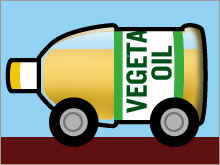|
Can vegetable-oil cars save the world? Used restaurant cooking oil is free, clean burning and can power your vehicle. So why aren't more people using it? NEW YORK (CNNMoney.com) -- Gas is expensive. Old vegetable cooking oil from restaurants is free. A car can actually run on either. So why aren't more people ditching petroleum and running on peanut power? "[Making the switch] couldn't be simpler," said Patrick Kuhn, who converted one of four trucks at his company, Charlotte Moving Truck Rentals, to run on vegetable oil earlier this year.
He said his customers love it and constantly choose the veggie-powered vehicle over his others. "I never see that truck anymore," he said. But while Kuhn's truck may be a hit, for many people life with a veggie car might not be so easy. And although this alternative fuel may be cheap and clean, there simply isn't enough of it to make a big dent in our gas consumption. Kuhn said it cost $3,500 to convert the truck to veggie power, which can be done to any diesel engine. That includes adding a fuel tank in the back (which has a heating element inside it, because the oil needs to be kept hot to burn), fuel lines up to the engine, as well as a filter and a valve set and toggle switches so the driver can choose between running on vegetable oil or on conventional diesel fuel. For the sake of convenience, he buys used restaurant cooking oil from a dealer about an hour away - the same guy, actually, who installed Kuhn's veggie fuel system. Kuhn pays the supplier - who collects, filters and delivers the oil - about $1.50 a gallon. That compares to the $3 a gallon he said he'd pay for diesel. "These trucks, they're not Honda Accords, they consume a lot of fuel," he said, "It pays for itself pretty quickly." Kuhn is part of what Lee Briante, a spokesman for Greasecar, the largest purveyor of veggie fuel conversion kits, says is a growing market segment. "In the first few years it was, I don't want to say hippies but...now it's folks doing it for the economy of it," said Briante. Indeed, the economics of veggie oil are even better for a car than they are for a truck. Briante said the car conversion kit, available online and similar to Kuhn's system, costs about $800. Hold the fries The mechanically inclined can install the system themselves, or it can be installed at one of two dozen Greasecar-certified mechanics nationwide for another $600. But Briante said that the government regulations requiring fuel sellers to be licensed would make it hard for most people to keep their veggie-cars fueled - few people would be lucky enough to have a guy nearby who can top off their tank the way Kuhn does. Instead, many people fuel up by forming a relationship with a local restaurant, which leaves its old cooking oil out back in 5-gallon jugs for the user to collect. (Restaurants usually have to pay to get rid of this oil, so proprietors are often happy to do so.) Another downside: Users have to strain the oil to clean out the old French fries and such, before they pour it into the tank. "The infrastructure really isn't in place," said Briante. "My mom's not going to want to do it." And since there just isn't that much vegetable oil available to power cars, it's unlikely that there will be ever be a push to build this infrastructure. Briante said there are about 100 million gallons of waste restaurant oil generated annually. That would only replace about 0.07 percent of the 140 billion gallons of gas Americans use each year, and that's assuming everyone switched from gasoline to diesel engines. Using new vegetable oil - not the used stuff from restaurants -raises similar scarcity questions. One environmental group, which declined to be identified, didn't have anyone to comment on the prospect of veggie oil reducing oil dependency or clearing up the air, calling it a "non-issue." But that doesn't mean veggie cars won't get more popular or become easier to operate. "With $3 diesel, I don't think it will take long before someone realizes 'hey, there's money to be made in this,'" said Kuhn. |
|


